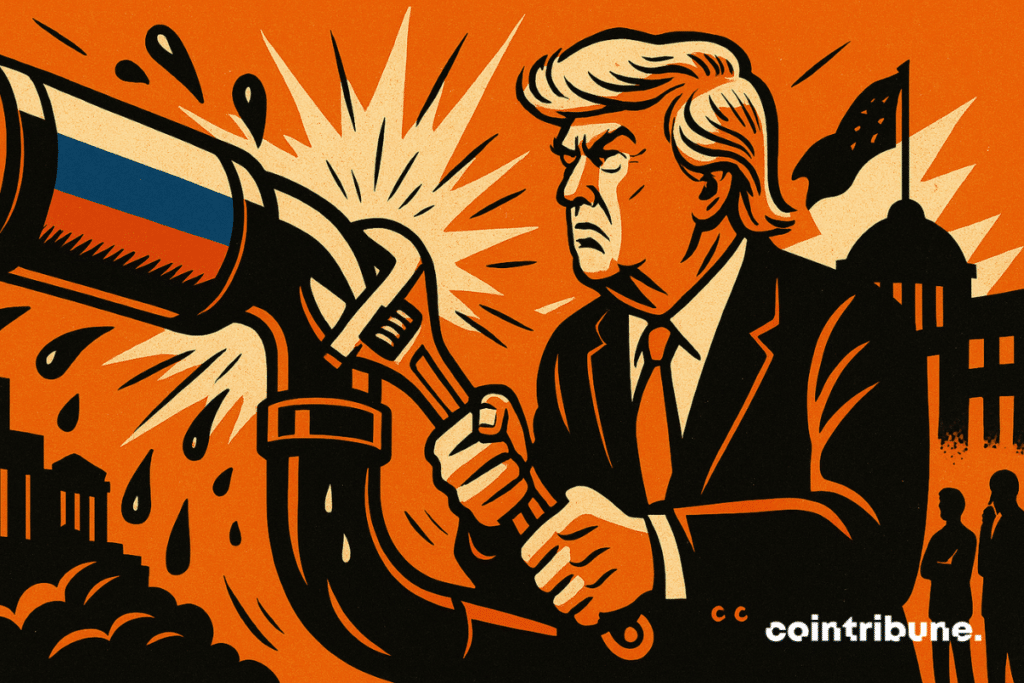Trump Pressures NATO to Halt Russian Oil Imports
As the war in Ukraine enters a critical phase, Donald Trump throws a wrench in the diplomatic pond. The American president stated that no new sanction against Moscow would be taken as long as NATO countries continue to buy Russian oil. This statement exposes the persistent fractures within the Alliance and revives the question of its strategic coherence towards Russia.

In brief
- Donald Trump conditions new sanctions against Russia on the complete halt of oil purchases by NATO countries.
- Several member states, including Hungary and Slovakia, continue to import Russian oil via the Druzhba pipeline, despite European sanctions.
- Trump accuses these practices of weakening the Alliance’s position towards Moscow and calls for a coordinated response.
- In parallel, he proposes imposing massive customs duties on Chinese products to break their support for Russia.
The energy ultimatum : Trump threatens to block sanctions
In a message broadcast this Saturday September 13 on his Truth Social network, Donald Trump issued a blunt warning to NATO members, as many observers predict an inevitable war between Europe and Russia. The American president states that he will not impose any new sanction against Moscow as long as allied countries continue to import Russian oil.
“I am ready to do major Sanctions on Russia when all NATO Nations have agreed, and started, to do the same thing, and when all NATO Nations STOP BUYING OIL FROM RUSSIA,” he wrote.
This statement comes in a tense geopolitical context, marked by the resurgence of tensions in Eastern Europe. Despite the EU sanctions imposed since 2022, some countries still enjoy exemptions.
The tone used by Trump reveals a desire to force the strategic unity of the Alliance, targeting member states that he believes have not respected their energy commitments towards Ukraine. Among the notable facts :
- Hungary and Slovakia, two NATO member countries, continue to import Russian oil via the Druzhba pipeline, which is still temporarily exempted from European sanctions;
- Trump expressed being “very unhappy” about this situation during a phone conversation in early September with European leaders from Paris, according to statements reported by Ukrainian President Volodymyr Zelensky;
- He accuses these practices of weakening NATO’s position towards Moscow, going so far as to call some behaviors “shocking”, without naming the countries concerned;
- Trump calls on NATO to act collectively to maintain a credible negotiation leverage, stressing that the continuous purchase of oil from Russia considerably weakens the Alliance’s pressure capability.
With this statement, the American president significantly hardens his tone towards his allies, issuing a real energy ultimatum. He links the diplomatic and economic action of the United States to a complete alignment of European practices, an approach that could complicate already fragile dynamics within NATO.
The economic weapon : China in Trump’s sights
Beyond energy, Donald Trump intends to strike on another front : economic relations with China, an influential member of the BRICS bloc. Still on Truth Social, he proposed that NATO countries collectively impose customs duties of 50 to 100 % on Chinese products, until the Russo-Ukrainian conflict is resolved.
This positioning aims to mobilize NATO not only as a military alliance but also as a trade bloc capable of waging a structured economic war against Moscow’s indirect supporters.
By targeting Beijing, Trump seeks to weaken economic support flows that would allow Russia to circumvent current sanctions, as notably done by India or Turkey. The logic is clear : financially isolate Moscow by limiting its oil outlets while pressuring its strategic partners.
Trump’s involvement in this matter raises questions about the viability of his approach. Can we realistically envision a NATO customs coalition against China in a context where European economies remain dependent on Chinese imports?
Trade tensions, as evidenced by the maintenance of tariffs on China by the United States, could further weaken global supply chains. Moreover, the effectiveness of such a strategy largely depends on the ability of alliance members to act in a coordinated manner, which remains uncertain. In the short term, this rhetorical escalation could especially increase geopolitical polarization and weaken diplomatic de-escalation efforts.
Maximize your Cointribune experience with our "Read to Earn" program! For every article you read, earn points and access exclusive rewards. Sign up now and start earning benefits.
Diplômé de Sciences Po Toulouse et titulaire d'une certification consultant blockchain délivrée par Alyra, j'ai rejoint l'aventure Cointribune en 2019. Convaincu du potentiel de la blockchain pour transformer de nombreux secteurs de l'économie, j'ai pris l'engagement de sensibiliser et d'informer le grand public sur cet écosystème en constante évolution. Mon objectif est de permettre à chacun de mieux comprendre la blockchain et de saisir les opportunités qu'elle offre. Je m'efforce chaque jour de fournir une analyse objective de l'actualité, de décrypter les tendances du marché, de relayer les dernières innovations technologiques et de mettre en perspective les enjeux économiques et sociétaux de cette révolution en marche.
The views, thoughts, and opinions expressed in this article belong solely to the author, and should not be taken as investment advice. Do your own research before taking any investment decisions.